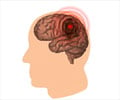Experts from medical and patient communities call for urgent action to prevent strokes that strike millions of people with atrial fibrillation (AF) each year across Asia-pacific.

A stroke epidemic across the Asia-Pacific region, and indeed the rest of the world, is imminent if actions are not taken now to slow the rising tide of preventable strokes occurring every year. Dr. Sim Kui Hian, Head, Department of Cardiology and Head, Clinical Research Centre, Sarawak General Hospital, Malaysia, commented, "The incidence of stroke across the Asia-Pacific region is continuing to grow and constitutes both a major public health issue and a significant economic burden. Members of Action for Stroke Prevention have come together to highlight the risk of a stroke crisis and urge policymakers, national governments, healthcare professionals, patient groups and medical societies to act together now to prevent the devastating impact stroke has on people, their families and carers."
Recommendations made by the Report include:
• Improving awareness of the impact of AF and AF-related stroke
• Developing methods for early and adequate diagnosis of AF and stroke risk assessment
• Taking new and better approaches to prevent stroke in patients with AF
Advertisement
• Developing strategies to support adherence to guidelines
Advertisement
• Strokes are preventable - prevent them
"With the majority of AF-related strokes being preventable, we believe that implementation of these recommendations now will contribute to the prevention of stroke in patients with AF and, in turn, reduce the dramatically increasing clinical, economic, and social burden of stroke in Asia-Pacific," said Professor Gregory Lip, Professor of Cardiovascular Medicine, University of Birmingham Centre for Cardiovascular Sciences, City Hospital, Birmingham, UK.
Every year, 15 million people worldwide experience a stroke.12 Approximately five million of these suffer permanent disabilities and over five million more die, accounting for 10 percent of all deaths worldwide.12-14
In the Asia-Pacific region in 2004, the approximate number of patients who had survived a stroke at some point in their lifetime was 4.4 million in Southeast Asia and 9.1 million in the Western Pacific region.14 In the same year, the number of first-ever strokes was 5.1 million across these regions.15 This was higher than the estimated number of new cases of cancer.15
People who suffer a stroke caused by AF are more likely to remain in the hospital longer, are less likely to be discharged home, and are 50 percent more likely to remain disabled16,17 than patients who have a stroke unrelated to AF. An increasing number of people in the Asia-Pacific region are living with AF. In China alone, up to eight million people suffer from AF.18,19
"Every year millions of people with AF who suffer a stroke are left disabled, regardless of their age," said Trudie Lobban, Founder and Trustee, Arrhythmia Alliance, and Co-founder and CEO, Atrial Fibrillation Association. "If we do not suffer with AF ourselves, we will almost certainly care for or know someone who does. It is imperative that we all act together to improve the diagnosis and management of AF if we are to prevent the enormous life-changing consequences that stroke has for patients and carers."
The current economic burden of strokes on national economies in Asia-Pacific is significant. For example, China will lose $558 billion in national income due to the combined consequences of heart disease, stroke, and diabetes.20
More significantly, the impact of stroke is predicted to rise dramatically as the number of individuals affected by AF is expected to increase due to an ageing population and improved survival of patients with conditions which predispose AF (e.g., heart attack).
Source-Eurekalert















